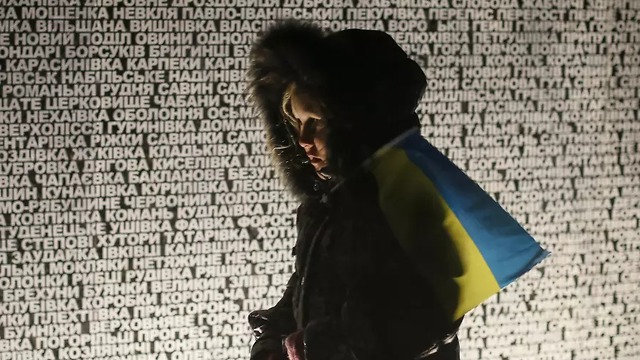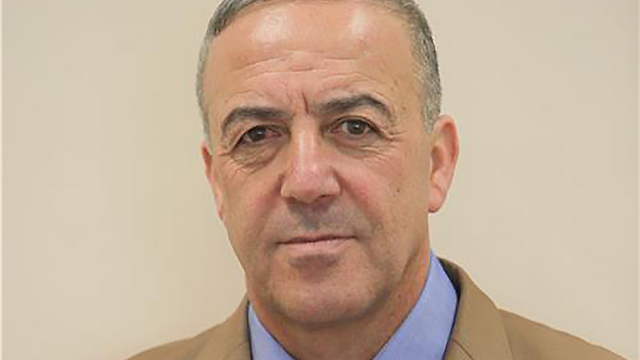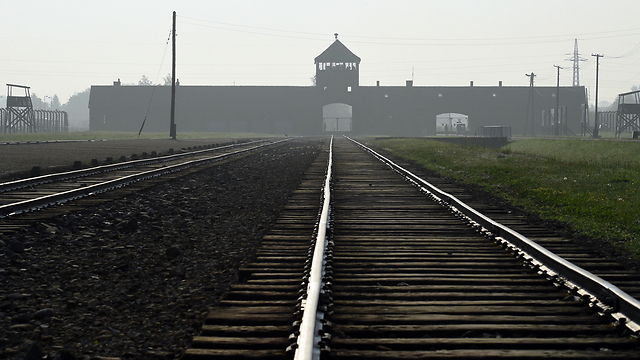
A young girl, draped in the Ukrainian flag, opposite a Holodomor memorial
Photo: Reuters
Russian envoy says Israeli bill on Ukraine's Stalin-era deaths a 'wrong step'
Bill by Kulanu MK Akram Hasson recognizing death by starvation of millions of Ukrainians in 1930s USSR as genocide draws Russia's ire; bill aims to 'rewrite history,' Russian deputy ambassador says, drawing comparison to Polish death camps bill.
A Russian diplomat cautioned Israel on Wednesday over a proposed law that would formally recognize the deaths of millions of Ukrainians under Soviet rule as genocide.
"This is not a good time to discuss such a proposal," Leonid Frolov, Russia's deputy ambassador in Tel Aviv, told Israel's Army Radio. "It will be bad. It will be (a) wrong step."
He was referring to preliminary legislation, submitted by a lawmaker from the centrist Kulanu party in Prime Minister Benjamin Netanyahu's governing coalition, that would declare December 6 a "Remembrance Day for the Ukrainian Genocide" in Israel.

A young girl, draped in the Ukrainian flag, opposite a Holodomor memorial. Hasson's bill sought to recognize the deaths of millions of Ukrainians as genocide (Photo: Reuters)
Ukraine's Holodomor, or death by starvation of as many as 10 million people in 1932-33, was denied by the Soviet Union for decades. Ukraine passed a resolution in 2016 appealing for world recognition of the Holodomor as genocide, angering Moscow.
Kiev is also embroiled in a row with Moscow over Russia's annexation in 2014 of the Crimea Peninsula.
The Israeli bill is still far from ratification, and faces opposition within the ruling coalition. While Netanyahu's office did not immediately comment, rightist Defense Minister Avigdor Lieberman called the bill's author, MK Akram Hasson, "delusional."
Hasson told Reuters he proposed the law after making a three-month fact-finding trip to Ukraine to examine the issue.

MK Hasson proposed the bill, saying, 'Israel was founded after a genocide, so why can it recognize another?'
"I don't know how anyone can be angry about this, and I'm under no obligation to please anyone," he said. "I work for the parliament of Israel—a democracy, with human values, founded after a genocide. Why shouldn't we recognize this genocide?"
Israel is mindful of Russian clout over its enemies Syria, Iran and Lebanon's Hezbollah. The Netanyahu government has long sought good ties with the Kremlin and Israel stayed out of the 2014 Crimea crisis even as the United States condemned Russia.
"Israel needs support not only of United States. Israel needs support of many other countries that think differently," said the Russian deputy ambassador, speaking in English.

The Auschwitz concentration camp in Poland. Deputy Ambassador Frolov drew comparisons between recent polish legislation and Hasson's bill (צילום: AP)
He referred to Israel's opposition to new Polish legislation that would criminalize suggestions that Poland was complicit in the Holocaust.
"Poland now wants to delete some pages of the history, and we are on the side of Israel," Frolov said, adding that the proposal by the Israeli lawmaker on Ukraine also aimed "to rewrite the history, like in the Polish case."
Ukraine's government says 17 countries—eight of them former Soviet republics or satellites—have recognized the Holodomor as a genocide.










